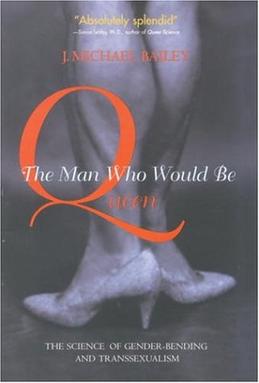The Man Who Would Be Queen
The Man Who Would Be Queen: The Science of Gender-Bending and Transsexualism is a book by J. Michael Bailey, published in 2003. The book discusses gender identity, transsexualism, and related psychological theories and research. Bailey, a professor of psychology at Northwestern University, presents a controversial view on transgender identity, heavily drawing on the research of Ray Blanchard and his typology of transsexualism. Blanchard categorizes trans women into two groups: "homosexual transsexuals," who are attracted to men, and "autogynephilic transsexuals," who are said to be aroused by the thought of themselves as female.
Summary[edit | edit source]
The book is divided into three parts. The first part explores the world of feminine (or "effeminate") gay men, the second part discusses the lives of transsexuals, and the third part delves into the science behind gender identity and sexual orientation. Bailey uses a mix of scientific research and personal anecdotes to argue that there are innate differences between men and women, and that these differences can lead to gender dysphoria and the desire for sex reassignment surgery in some individuals.
Controversy[edit | edit source]
The Man Who Would Be Queen has sparked significant controversy and criticism, particularly from the LGBTQ+ community and some professionals in psychology and gender studies. Critics argue that Bailey's reliance on Blanchard's typology is flawed and oversimplifies the complex nature of gender identity. Furthermore, allegations have been made regarding the ethical conduct of Bailey's research and the way he obtained information from his subjects. The book has been accused of being transphobic and of contributing to the stigmatization of transgender individuals.
Impact[edit | edit source]
Despite the controversy, The Man Who Would Be Queen has ignited discussions on gender identity, the science of transsexualism, and the classification of gender dysphoria in psychological and medical fields. It has been cited in academic papers and has influenced debates on the treatment and understanding of transgender individuals.
See Also[edit | edit source]
Search WikiMD
Ad.Tired of being Overweight? Try W8MD's physician weight loss program.
Semaglutide (Ozempic / Wegovy and Tirzepatide (Mounjaro / Zepbound) available.
Advertise on WikiMD
|
WikiMD's Wellness Encyclopedia |
| Let Food Be Thy Medicine Medicine Thy Food - Hippocrates |
Translate this page: - East Asian
中文,
日本,
한국어,
South Asian
हिन्दी,
தமிழ்,
తెలుగు,
Urdu,
ಕನ್ನಡ,
Southeast Asian
Indonesian,
Vietnamese,
Thai,
မြန်မာဘာသာ,
বাংলা
European
español,
Deutsch,
français,
Greek,
português do Brasil,
polski,
română,
русский,
Nederlands,
norsk,
svenska,
suomi,
Italian
Middle Eastern & African
عربى,
Turkish,
Persian,
Hebrew,
Afrikaans,
isiZulu,
Kiswahili,
Other
Bulgarian,
Hungarian,
Czech,
Swedish,
മലയാളം,
मराठी,
ਪੰਜਾਬੀ,
ગુજરાતી,
Portuguese,
Ukrainian
Medical Disclaimer: WikiMD is not a substitute for professional medical advice. The information on WikiMD is provided as an information resource only, may be incorrect, outdated or misleading, and is not to be used or relied on for any diagnostic or treatment purposes. Please consult your health care provider before making any healthcare decisions or for guidance about a specific medical condition. WikiMD expressly disclaims responsibility, and shall have no liability, for any damages, loss, injury, or liability whatsoever suffered as a result of your reliance on the information contained in this site. By visiting this site you agree to the foregoing terms and conditions, which may from time to time be changed or supplemented by WikiMD. If you do not agree to the foregoing terms and conditions, you should not enter or use this site. See full disclaimer.
Credits:Most images are courtesy of Wikimedia commons, and templates Wikipedia, licensed under CC BY SA or similar.
Contributors: Prab R. Tumpati, MD

